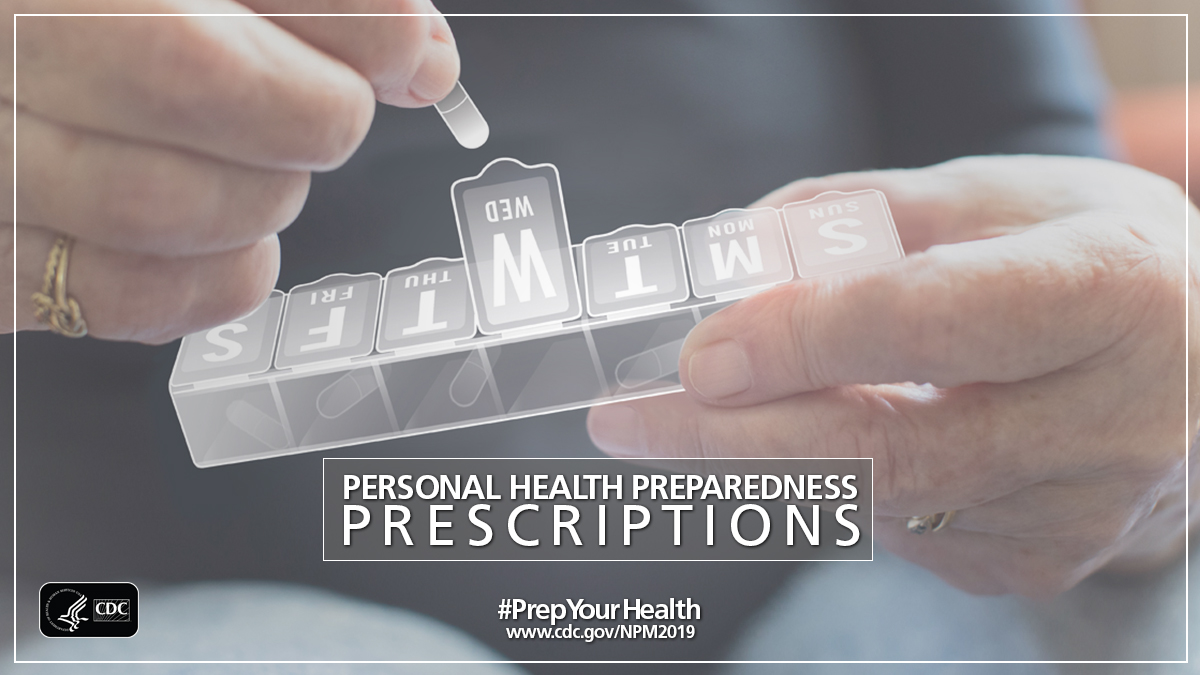A Prescription for Preparedness
Posted on by
September is National Preparedness Month. Throughout the month, the Center for Preparedness and Response will publish posts that highlight the work of public health departments as it relates to personal health preparedness themes. This week’s theme is Prescriptions.
Imagine a major hurricane has taken aim at where you live. Local authorities have not ordered an evacuation for your area, but—as you know from experience—hurricanes don’t only affect people living along the coast; they can cause flooding and power outages hundreds of miles inland.
In the course of preparing for this hypothetical hurricane, you gather personal needs, paperwork, and power sources. While taking stock of your family’s prescriptions, you notice that you’re running low on a few maintenance medications. You have enough to see you through the next 7 to 10 days, but what if there’s a prolonged power outage? What if you have to evacuate? You’re also not due for a refill.
What can you do? The answer—at least in part—is that it depends on where you live.
Emergency Prescription Laws
Some states have emergency prescription refill laws that authorize pharmacies and pharmacists to dispense early refills of certain medications when under an emergency declaration. These laws vary by state.
The following is a state-by-state list of emergency prescription refill laws. Contact your state health department or board of pharmacy or talk to your pharmacist to learn more about the law where you live.
- Alabama
- Alaska
- Arizona
- Arkansas
- California
- Colorado
- Connecticut
- Delaware
- Florida
- Georgia
- Hawaii
- Idaho
- Illinois
- Indiana
- Iowa
- Kansas
- Kentucky
- Louisiana
- Maine
- Maryland
- Massachusetts
- Michigan
- Minnesota
- Mississippi
- Missouri
- Montana
- Nebraska
- Nevada
- New Hampshire
- New Jersey
- New Mexico
- New York
- North Carolina
- North Dakota
- Ohio
- Oklahoma
- Oregon
- Pennsylvania
- Rhode Island
- South Carolina
- South Dakota
- Tennessee
- Texas
- Utah
- Vermont
- Virginia
- Washington
- West Virginia
- Wisconsin
- Wyoming
Prepare Your Health
The important piece for you to consider now is not to wait until there’s an emergency to find out if you can get an emergency prescription refill. If you are one of the millions of Americans who depend on prescription drugs, act now:
- Talk to your doctor about creating an emergency supply of prescription and over-the-counter medications.
- Keep an up-to-date list of all prescription medications. According to Healthcare Ready, 40 percent of survey participants said they could list all their prescription details if they were without their medications in an evacuation.(2)
- Pet owners: Work with your veterinarian to prepare an emergency supply of medications, including flea, tick, and heartworm preventative.
What if you’re uninsured and you find yourself in a federally-declared disaster area without your medication and medical supplies, or you’re in need of a vaccination? There are federal funds available to help eligible people get the emergency assistance that they need.
Emergency Assistance
The Emergency Prescription Assistance Program (EPAP) helps people who live in a federally-declared disaster area and do not have health insurance. Eligible people can receive a free 30-day supply of their medications for as long as EPAP is active. People can also use the program to receive vaccinations or to replace certain medical supplies or some forms of medical equipment that were lost or damaged because of the emergency or while evacuating.
For more information, recommendations, and tips on how to Prepare Your Health for a natural disaster or emergency, please visit www.cdc.gov/cpr/prepareyourhealth.
References
- An Assessment of State Board of Pharmacy Legal Documents for Public Health Emergency Preparedness
- Poll Reveals Lack of Preparedness in The Face of Increasingly Frequent Disasters
Thanks in advance for your questions and comments on this Public Health Matters post. Please note that the CDC does not give personal medical advice. If you are concerned you have a disease or condition, talk to your doctor.
Have a question for CDC? CDC-INFO (https://www.cdc.gov/cdc-info/index.html) offers live agents by phone and email to help you find the latest, reliable, and science-based health information on more than 750 health topics.
One comment on “A Prescription for Preparedness”
Comments listed below are posted by individuals not associated with CDC, unless otherwise stated. These comments do not represent the official views of CDC, and CDC does not guarantee that any information posted by individuals on this site is correct, and disclaims any liability for any loss or damage resulting from reliance on any such information. Read more about our comment policy ».


Thank you for this post……